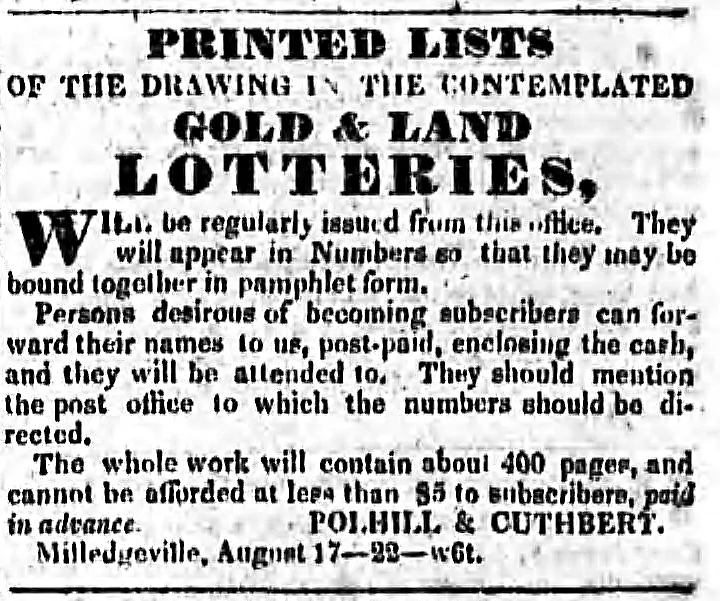It's not every day that a town gets outed for it's questionable actions.
I think this one speaks for itself.

On Christmas Eve in 1830, the population of Hall County, Georgia doubled in size – a large crowd had turned out to witness the illegal hanging of Cherokee, George Corn Tassel.
Just a few generations later, an annual festival which bore Corn Tassel’s name became the biggest festival in Hall County – and it remains so, today.
A few years prior to this grotesque public violation of Indigenous Rights – in 1827 – the state of Georgia had already begun a systematic assault on the Cherokee Republic and Cherokee Constitution.
Georgia fought rabidly against, and willfully refused to uphold, the federal treaties the Cherokee had signed with the United States government.
The so-called “Empire State of the South” also began to demand their forced removal – an act of ethnic cleansing that would now be in direct violation of international law.
After being warned by President Adams against violating the treaties, Georgia flaunted its (still) deep currents of militia culture and used them to illegally occupy Creek territories, daring the federal government to respond.
Their ultimatum ultimately worked; the U.S. government did not respond to the illegal armed occupations.
In 1828, Georgia officially passed a resolution demanding the governor petition the president to uphold their aims for the forced removal of all Native Americans from the state’s colonial borders.
This same year, Georgia passed a series of laws which explicitly took away the rights of Cherokees to testify against white settlers in a court of law.
Despite having their own government and constitution, the Cherokee Nation was increasingly subjected to Georgia’s legislation that expanded the legal jurisdictions of adjoining counties to include Cherokee lands.
An 1829 Georgia law actually declared any action made by the Cherokee government to be invalid.
This gave settlers and militias free reign to invade, terrorize, and pillage Cherokee homes and villages; and, the Cherokee were given until 1830 to leave their rightful land – as per Georgia ‘state law’.

Auction advertisement for Cherokee land; 1832. Athens Historic Newspapers Archive, Digital Library of Georgia.
(Between 1832 and 1833, Georgia held the final auctions which would systematically dismantle the Cherokee Nation in the form of a state-sponsored land grab).
The year 1828 also brought the election of President Andrew Jackson – who came to be known as “Chickensnake” by the Cherokee, a metaphor for the sinister tactics he deployed to try to charm them the way a snake charms a chicken.
Some Cherokee had fought alongside Jackson against the Creeks during the battle of Horseshoe Bend in 1814, and would live to regret it.
As president, Jackson proved notoriously instrumental in the attempts to ethnically cleanse Native Americans from the southeastern United States – and in facilitating the withdrawal of all federal troops from Georgia under his national tenure.
Jackson was on a mission of his own to consolidate the powers of his presidency; and, in step with this, he broke with two Supreme Court decisions that declared Georgia had no authority on or over Native Territories.
He did this by turning a blind eye as Georgia’s militias placed over 9 million acres of Cherokee land under violent siege.
As Walter R. Echo-Hawk documented in his text, In the Courts of the Conqueror: The 10 Worst Indian Law Cases Ever Decided,
“To enforce Georgia’s growing body of anti-Cherokee laws, a special paramilitary force was created—the infamous Georgia Guard.
Its mission was to enforce state law within the Cherokee Nation, arrest violators, ‘protect’ Cherokee gold mines, and otherwise harass and intimidate the Indians.”
It was in this political landscape that George Corn Tassel was accused of murdering another Cherokee man on Cherokee territory at Talking Rock, now part of Pickens County, Georgia.
Years earlier, George Corn Tassel’s father, Old Tassel (also known as Onitossitah as well as Corn Tassel), a Cherokee Peace Chief from Chota in the Overhills, was murdered by militia members while holding a flag of truce in 1788 near Chilhowee, North Carolina.
'Muricans are gonna have to come to terms with their true history.
This is such a sad part of our history, that most people are completely unaware of.......... and we did this to our our people😞
My Wife is part Cherokee, and my children are the last “legal “ fraction of Cherokee...... so sad..... 😕
Yep, #skoolsux.
Rule by force is the disease, who and how are symptoms.
Ein kleiner Testbot, dem dein Beitrag gefällt und dir ein Upvote da lässt. Vielleicht freust dich ja drüber.Hallo, ich bin @nr5lebt.
Source
Spamming comments is frowned upon by the community. Continued comment spamming may result in action from the cheetah bot.
More Information:
The Art of Commenting
Comment Classifications
Please, don't spam.